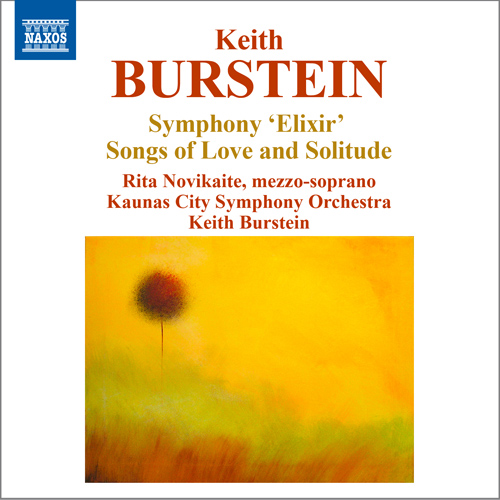BURSTEIN, K.: Symphony, "Elixir" / Songs of Love and Solitude (Novikaite, Kaunas City Symphony, Burstein)
Responding to the music of Keith Burstein’s Symphony ‘Elixir’, critic David Sonin described the composer as “a contemporary master of tonality”. Burstein was encouraged by conductor Vladimir Ashkenazy to develop the work beyond its many-layered and dynamically driven first movement, which was conceived as a Concerto for Orchestra. He added a second Adagio movement with its long soaring melody and polyphonic counter-themes,and gathered the disparate elements of these movements into a final scintillating dance. The Songs of Love and Solitude were written to compliment the symphony, their twelve fleeting visions implying hidden dramas which range in experience from tempestuous darkness to serenity and acceptance.
Tracklist
Burstein, Keith (Conductor)
Burstein, Keith (Conductor)
Burstein, Keith (Conductor)
Burstein, Keith (Conductor)
Burstein, Keith - Lyricist
Kaunas City Symphony Orchestra (Orchestra)
Burstein, Keith (Conductor)
Kaunas City Symphony Orchestra (Orchestra)
Burstein, Keith (Conductor)
Kaunas City Symphony Orchestra (Orchestra)
Burstein, Keith (Conductor)
Kaunas City Symphony Orchestra (Orchestra)
Burstein, Keith (Conductor)
Kaunas City Symphony Orchestra (Orchestra)
Burstein, Keith (Conductor)
Kaunas City Symphony Orchestra (Orchestra)
Burstein, Keith (Conductor)
Kaunas City Symphony Orchestra (Orchestra)
Burstein, Keith (Conductor)
Kaunas City Symphony Orchestra (Orchestra)
Burstein, Keith (Conductor)
Kaunas City Symphony Orchestra (Orchestra)
Burstein, Keith (Conductor)
Kaunas City Symphony Orchestra (Orchestra)
Burstein, Keith (Conductor)
Kaunas City Symphony Orchestra (Orchestra)
Burstein, Keith (Conductor)
Kaunas City Symphony Orchestra (Orchestra)
Burstein, Keith (Conductor)
Kaunas City Symphony Orchestra (Orchestra)
Burstein, Keith (Conductor)
The cellist Károly Botvay studied at the Budapest Academy, where his teachers included Zoltán Kodály. Among prizes he won were a first prize diploma from the Hungarian Arts Council, a first prize in the Bartók Competition and in the Hungarian Bach Competition. In 1960 he joined the Komlós Quartet, which later acquired an international reputation as the Bartók Quartet, touring with the ensemble for seventeen years and also pursuing a solo career as a soloist in Hungary and in Eastern Europe. Since his first concert tour of England in 1978 he has established a reputation there as a soloist. In the same year he became cellist of the Aldeburgh String Trio and in 1979 joined the Végh Quartet, with which he has appeared throughout Europe. In 1985 he joined the New Budapest String Quartet. He has recorded for Hungaroton, Erato and Naxos and is a member of the teaching staff of the Liszt Academy.































